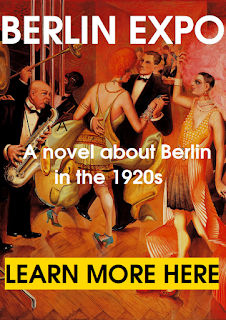Alexander Moissi, a
Berliner ? But he was born in Trieste, an Italian town belonging
to Austria-Hungary. But his native name was Aleksandër Moisiu, an
Albanian name, as his father had those origins. But his theatrical
debut – because Moissi-Moissiu was an actor, a great actor at that
– was not in Berlin but in Vienna and in Prague. So, why should we
consider him, of all possible things, a Berliner ?
Because in 1903, at
24, he joined the Deutsches Theater in the capital of the German
Reich. There, he became a protégé of the influential director Max
Reinhardt. From then on, his meteoric career developed in Berlin,
with occasional appearances in Russia and in the United States.
Alexander Moissi, a name today forgotten, made women's hearts beat faster in the first decades of the twentieth century, as did Enrico Caruso and Rudolf Valentino. Moissi led the life of a pop star, a Casanova and an adventurer. In contemporary pieces by Ibsen, Wedekind and Pirandello, he played modern characters – young, strife-torn, depravity-seeking men. But he also excelled in classical plays by Shakespeare and Tolstoy.
No one died on stage
as often and as beautifully as Moissi. He was between 1910 and 1930
the most famous and maybe the first truly modern actor in
German-speaking theatre. His biographer Rüdiger Schaper writes that
Moissi "personified the moment when psychology broke into art."
Unlike most of the
great German actors before him, Moissi was not a native German
speaker. He was born in Albania and grew up speaking Greek and
Italian. In none of his performances did he lose his Mediterranean
inflection. But that did not diminish his
stature; it enhanced it.
Max Reinhardt
"discovered" Moissi and initiated his transformation from
a provincial cafe singer to an
international star. Reinhardt liked Moissi’s accent. He liked the
chutzpa in speaking that exotic way before a Berlin audience.
Reinhardt often cast foreigners—Hungarians, Russians, Poles, even
Americans—because the director sought an alternative to “high
German” stage speech.
Franz Werfel and
Stefan Zweig were enthusiastic about Moissi, though Franz Kafka was
less impressed.
Moissi was the
archetypical cosmopolitan character, as was Stefan Zweig. But whereas
Zweig, though speaking several languages and moving freely across
Europe, was nevertheless an Austrian national, Moissi’s national identity
was richer and more complex. He
was
born 1879
in
the harbour city of Trieste, Italy’s
most international, under Austrian rule at that time.
His
father was Albanian (then a province of the Ottoman empire),
He was thus an Austrian of Italian-Albanian
origin, who
later became a German actor.
In Berlin, he was a protégé of Max
Reinhardt. However, Moissi did not keep up with later theatrical movements, initiated by Bertolt Brecht or by Erwin
Piscator
In
1914, he acquired German
citizenship to become a volunteer in World
War I, and during the German
Revolution of 1918–19 joined the Marxist Spartacus
League.
Although
a Christian, Moissi was often labeled as Jewish due to his name. He
wasn’t, but he was
a starch enemy of anti-semitism.The arrival of the Nazis to power put an end to his career.
He
died in 1935.
 |




No comments:
Post a Comment